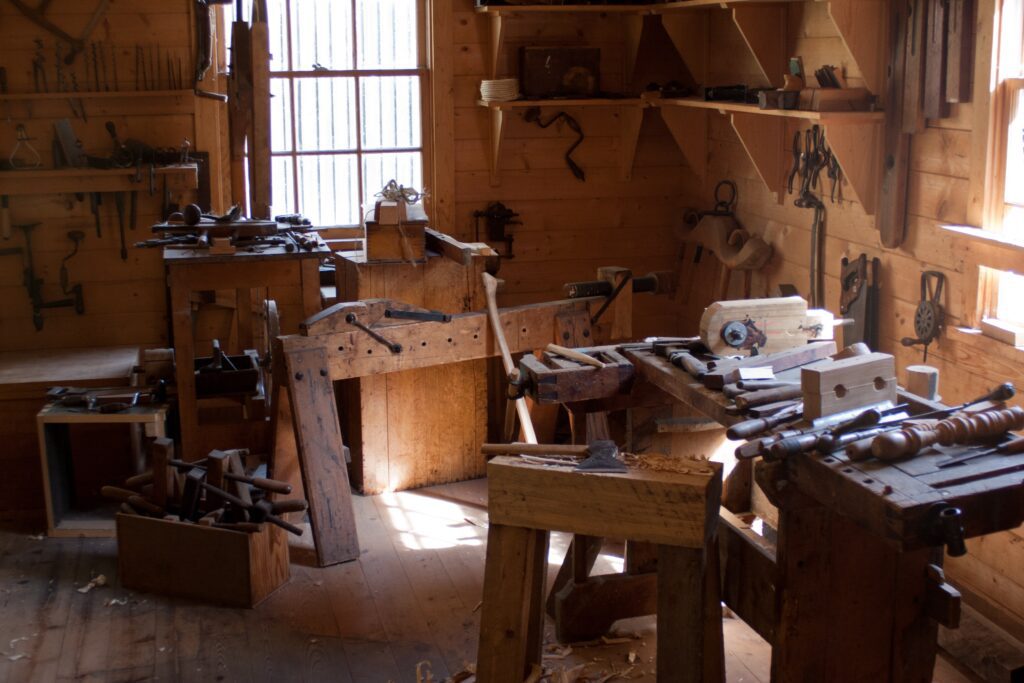One crucial factor to consider when setting up an industrial workshop is the type of flooring to choose. The appropriate flooring can significantly impact the performance, safety, and overall functionality of the workshop. This article aims to provide guidance on how to make the right flooring choice, taking into account factors such as durability, resistance to chemicals, ease of maintenance, and suitability for various industrial activities. By understanding these considerations, workshop owners can make informed decisions that ultimately enhance the efficiency and effectiveness of their operations.
Understanding Your Workshop Needs
Industrial workshops have unique requirements when it comes to choosing the right flooring. Before considering the different types of flooring available, it is crucial to identify the type of work that will be conducted in the workshop. Different industries have varying needs, such as heavy machinery, high foot traffic, or the possibility of chemical spills. Understanding these specific requirements is essential in selecting the most suitable flooring option.
Additionally, consideration should be given to the weight load and traffic volume that the flooring will need to withstand. Some workshops may have heavy equipment moving constantly, while others may have less frequent movement but with heavier loads. It is important to choose a flooring material that can support the weight and traffic for optimum safety and longevity.
Finally, cleanliness and maintenance play a significant role in an industrial workshop. Some industries require stringent cleanliness standards, while others may have less strict requirements. The level of maintenance needed for each flooring type should be evaluated to ensure that it meets the workshop’s needs and can be easily maintained for the long term.
Assessing Different Types of Industrial Flooring
There are several types of industrial flooring available, each with its own unique characteristics and benefits. Concrete flooring, epoxy flooring, rubber flooring, vinyl flooring, and ceramic tiles are among the most common choices for industrial workshops. Let’s explore each option in detail.
Concrete Flooring
Concrete flooring is a popular choice for industrial workshops due to its durability and strength. It is capable of withstanding high levels of weight and traffic, making it suitable for workshops with heavy machinery and equipment. Concrete flooring is also known for its resistance to chemicals and is easy to clean and maintain. The installation process of concrete flooring is relatively straightforward, making it a practical choice for many workshops.
Epoxy Flooring
Epoxy flooring is a highly durable option that offers excellent resistance to chemical spills, making it ideal for workshops that handle hazardous materials. It provides a seamless and smooth surface that is easy to clean and maintain. The installation process of epoxy flooring involves applying multiple layers of epoxy resin to the concrete base, creating a strong and long-lasting flooring surface. Epoxy flooring is available in a range of colors and designs, allowing workshops to choose a style that suits their aesthetic preferences.
Rubber Flooring
Rubber flooring is known for its sound-dampening qualities, making it suitable for workshops that require noise reduction. It provides a comfortable surface for workers who spend long hours on their feet, offering excellent resilience and cushioning. Rubber flooring is available in various designs and colors, giving workshops the freedom to create a visually appealing environment while maintaining functionality.
Vinyl Flooring
Vinyl flooring is a versatile option that is easy to install and maintain. It offers durability and can withstand heavy traffic, making it a cost-effective choice for industrial workshops. Vinyl flooring is available in a range of designs and patterns, allowing workshops to achieve the desired aesthetic appeal. It also provides a moisture-resistant surface, making it suitable for areas where water exposure may occur.
Ceramic Tiles
Ceramic tiles are known for their resistance to heat and water, making them a suitable flooring option for workshops that require these properties. They offer a wide range of design choices, allowing workshops to create a visually appealing space. Ceramic tiles are also highly durable and long-lasting, ensuring that the flooring will withstand the demands of industrial work.



This image is property of images.unsplash.com.
Analyzing the Benefits of Concrete Flooring
Concrete flooring offers several advantages that make it a popular choice for industrial workshops. One of the primary benefits is its durability and strength. Concrete is capable of withstanding heavy loads and high levels of traffic without wearing down or cracking. This durability ensures that the flooring will last for many years, even under the most demanding conditions.
Another advantage of concrete flooring is its ease of maintenance and cleaning. Unlike some other flooring options, concrete does not require extensive upkeep. Regular sweeping and occasional mopping are typically sufficient to keep the surface clean. Additionally, spills and stains can be easily wiped away without causing damage to the flooring.
The installation process of concrete flooring is relatively simple. It involves pouring and curing the concrete onto the prepared surface. Once the concrete is set, it forms a solid and durable surface that is ready for use. This process is efficient and does not require extensive downtime for the workshop.
Evaluating the Pros of Epoxy Flooring
Epoxy flooring offers several benefits that make it an attractive choice for industrial workshops. One of the main advantages is its high resistance to chemical spills. Epoxy coatings create a barrier that prevents chemicals from seeping into the concrete, protecting both the flooring and the underlying structure. This resistance to chemicals ensures that the workshop remains safe and functional even in environments where hazardous materials are present.
In addition to chemical resistance, epoxy flooring is highly durable and can withstand heavy loads and high traffic. The multiple layers of epoxy resin create a strong and durable surface that can withstand the demands of industrial work. This durability ensures that the flooring will last for many years without significant wear or damage.
The installation process of epoxy flooring involves several steps, including surface preparation, epoxy primer application, and the final epoxy coating. While the process can be time-consuming, it results in a seamless and smooth surface that is easy to clean and maintain. With proper installation and maintenance, epoxy flooring can provide a long-lasting and visually appealing surface for industrial workshops.



This image is property of images.unsplash.com.
Discussing the Advantages of Rubber Flooring
Rubber flooring offers several advantages that make it a desirable choice for industrial workshops. One of the primary benefits is its sound-dampening qualities. Rubber absorbs sound, reducing noise levels in the workshop and creating a quieter and more comfortable environment for workers. This is particularly beneficial in workshops where heavy machinery or equipment is in use.
Another advantage of rubber flooring is its resilience and comfort. The cushioning properties of rubber provide a comfortable surface for workers who spend long hours standing. It absorbs impact, reducing fatigue and discomfort. Additionally, rubber flooring is highly durable and can withstand heavy loads and high traffic, ensuring longevity in the workshop environment.
Rubber flooring is available in a variety of designs and colors, allowing workshops to create a visually appealing space. Whether the goal is to incorporate company branding or simply enhance the aesthetics of the workshop, rubber flooring offers a versatile and customizable solution.
Recognizing the Attributes of Vinyl Flooring
Vinyl flooring offers several attributes that make it a practical choice for industrial workshops. One of the main advantages is the ease of installation. Vinyl flooring can be installed over existing subfloors without the need for extensive preparation. This saves both time and money during the installation process.
Maintenance of vinyl flooring is also relatively simple. Regular sweeping and occasional mopping are usually sufficient to keep the surface clean. Additionally, vinyl flooring is resistant to stains and spills, making it easy to maintain even in environments where the risk of accidents is high. This durability ensures that the workshop remains functional and visually appealing over time.
Vinyl flooring is known for its durability and can withstand heavy traffic without significant wear or damage. This makes it an ideal choice for industrial workshops that experience constant movement and high foot traffic. Additionally, vinyl flooring is cost-effective compared to some other options, making it a budget-friendly choice for workshops with financial constraints.



This image is property of images.unsplash.com.
Highlighting the Strengths of Ceramic Tiles
Ceramic tiles offer several strengths that make them a suitable choice for industrial workshops. One of the primary attributes is their resistance to heat and water. This makes ceramic tiles ideal for workshops where high temperatures or water exposure may occur. The tiles’ ability to withstand these environmental factors ensures that the flooring remains functional and visually appealing.
Another advantage of ceramic tiles is the broad selection of design choices available. They come in various shapes, sizes, and colors, allowing workshops to create a customized look that suits their aesthetic preferences. Whether the goal is to create a vibrant and visually stunning space or a more subdued and professional environment, ceramic tiles offer a versatile and attractive solution.
Ceramic tiles are highly durable and long-lasting, making them an investment that will stand the test of time. They can withstand heavy loads and high levels of traffic without significant wear or damage, ensuring that the workshop remains functional and safe. This longevity makes ceramic tiles a practical choice for industrial workshops that require a flooring option with exceptional durability.
Factors for Consideration in Flooring Choice
When choosing the right flooring for an industrial workshop, several factors need to be taken into consideration.
One of the primary considerations is budget constraints. Different flooring options vary in cost, and it is important to find one that aligns with the workshop’s budget. It is essential to balance the desired features and benefits with the available budget to select the most suitable flooring option.
The time required for flooring installation should also be taken into account. Some options, such as epoxy flooring, may require a longer installation process, while others, like vinyl flooring, can be installed relatively quickly. The availability of downtime for the installation should be considered to minimize disruption to the workshop’s operations.
Expected lifespan is another factor to consider. Some flooring options, such as concrete or ceramic tiles, have a longer lifespan compared to others. Understanding the expected longevity of each flooring type is crucial in making an informed decision and avoiding premature replacement or repair costs.
Lastly, environmental concerns and sustainability should be considered when selecting the flooring. Some options, like rubber or vinyl flooring, can be more eco-friendly compared to others. Considering the environmental impact and sustainability of each flooring type aligns with responsible business practices and may contribute to certifications or building standards, if applicable.
Seeking Professional Advice
When faced with the decision of selecting the most suitable flooring for an industrial workshop, seeking professional advice is highly recommended. Industrial flooring specialists can provide valuable insights and recommendations based on their expertise and experience. They can assess the workshop’s specific needs and requirements and suggest the most suitable flooring options accordingly.
Additionally, learning from case studies and best practices in similar industries can provide valuable guidance in making an informed decision. By understanding how other workshops have addressed their flooring needs, valuable insights and lessons can be gained, helping to select the best flooring option for the workshop.
Obtaining quotes from various contractors is also beneficial in comparing costs and evaluating the feasibility of different flooring options. Contractors can assess the workshop’s specific requirements and provide detailed cost estimates, allowing for an accurate comparison of different options. By considering the advice of professionals and obtaining multiple quotes, an informed decision can be made regarding the choice of flooring for the industrial workshop.
Installation and Maintenance Tips
Once the right flooring has been selected, proper installation and maintenance are essential for ensuring its longevity and functionality. The following tips provide guidance on installation and maintenance best practices for different flooring types.
Preparation Steps Before Installation
Before installing any type of flooring, thorough preparation of the subfloor is crucial. The subfloor should be clean, dry, and level to ensure a proper installation. Any existing flooring or debris should be removed, and the subfloor should be inspected for cracks or damage that may require repair. Proper preparation of the subfloor is the foundation for a successful flooring installation.
Installation Best Practices
Each type of flooring has specific installation requirements, and following the manufacturer’s instructions is essential for a successful installation. It is important to use the correct adhesives, tools, and techniques specified by the manufacturer to ensure a secure and long-lasting installation. Proper installation minimizes the risk of damage or premature wear, ensuring the flooring’s functionality and durability.
Maintenance Routine for Different Flooring Types
Every flooring type has different maintenance requirements, and it is important to establish a routine that meets these needs. Regular cleaning is essential for removing dirt, dust, and debris that can cause surface damage or create a hazardous environment. Different flooring types may require specific cleaning products or techniques, and it is important to follow the manufacturer’s recommendations.
Additionally, regular inspections should be conducted to identify any signs of wear or damage that may require immediate repair. Addressing maintenance issues promptly can prevent further damage and prolong the lifespan of the flooring.
Emergency Repair Tips
In the event of unexpected damage or wear, it is important to have emergency repair tips in mind for each flooring type. This may include having spare flooring materials or repair kits on hand to address immediate repairs. Knowing the proper techniques for repairing or replacing damaged sections of the flooring is crucial to maintain a safe and functional workshop environment.
In conclusion, choosing the right flooring for an industrial workshop requires careful consideration of the specific needs and requirements. Identifying the type of work, weight load, traffic volume, cleanliness, and maintenance requirements is essential in making an informed decision. Assessing the benefits and strengths of different flooring options, such as concrete, epoxy, rubber, vinyl, and ceramic tiles, allows for a comprehensive evaluation of their suitability. Taking into account factors such as budget constraints, installation time, expected lifespan, and environmental concerns helps in selecting the most suitable flooring option. Seeking professional advice, learning from case studies, and obtaining quotes from contractors further assists in making an informed decision. Finally, following proper installation and maintenance practices maximizes the longevity and functionality of the chosen flooring option, ensuring a safe and efficient industrial workshop.
